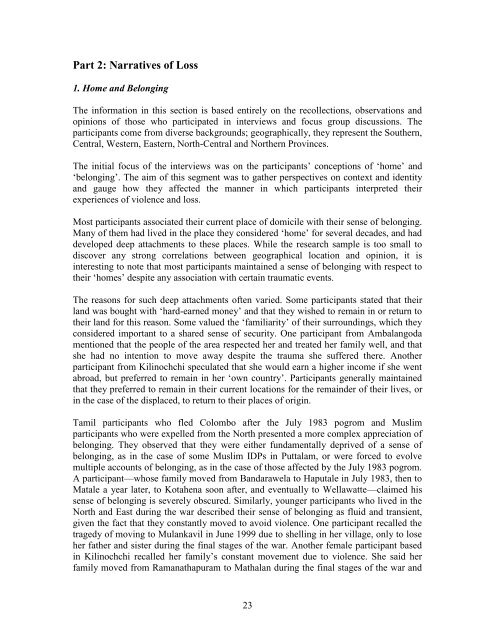Confronting the Complexity of Loss
truth memory justice_final- 11st sep 2015
truth memory justice_final- 11st sep 2015
- No tags were found...
Create successful ePaper yourself
Turn your PDF publications into a flip-book with our unique Google optimized e-Paper software.
Part 2: Narratives <strong>of</strong> <strong>Loss</strong><br />
1. Home and Belonging<br />
The information in this section is based entirely on <strong>the</strong> recollections, observations and<br />
opinions <strong>of</strong> those who participated in interviews and focus group discussions. The<br />
participants come from diverse backgrounds; geographically, <strong>the</strong>y represent <strong>the</strong> Sou<strong>the</strong>rn,<br />
Central, Western, Eastern, North-Central and Nor<strong>the</strong>rn Provinces.<br />
The initial focus <strong>of</strong> <strong>the</strong> interviews was on <strong>the</strong> participants’ conceptions <strong>of</strong> ‘home’ and<br />
‘belonging’. The aim <strong>of</strong> this segment was to ga<strong>the</strong>r perspectives on context and identity<br />
and gauge how <strong>the</strong>y affected <strong>the</strong> manner in which participants interpreted <strong>the</strong>ir<br />
experiences <strong>of</strong> violence and loss.<br />
Most participants associated <strong>the</strong>ir current place <strong>of</strong> domicile with <strong>the</strong>ir sense <strong>of</strong> belonging.<br />
Many <strong>of</strong> <strong>the</strong>m had lived in <strong>the</strong> place <strong>the</strong>y considered ‘home’ for several decades, and had<br />
developed deep attachments to <strong>the</strong>se places. While <strong>the</strong> research sample is too small to<br />
discover any strong correlations between geographical location and opinion, it is<br />
interesting to note that most participants maintained a sense <strong>of</strong> belonging with respect to<br />
<strong>the</strong>ir ‘homes’ despite any association with certain traumatic events.<br />
The reasons for such deep attachments <strong>of</strong>ten varied. Some participants stated that <strong>the</strong>ir<br />
land was bought with ‘hard-earned money’ and that <strong>the</strong>y wished to remain in or return to<br />
<strong>the</strong>ir land for this reason. Some valued <strong>the</strong> ‘familiarity’ <strong>of</strong> <strong>the</strong>ir surroundings, which <strong>the</strong>y<br />
considered important to a shared sense <strong>of</strong> security. One participant from Ambalangoda<br />
mentioned that <strong>the</strong> people <strong>of</strong> <strong>the</strong> area respected her and treated her family well, and that<br />
she had no intention to move away despite <strong>the</strong> trauma she suffered <strong>the</strong>re. Ano<strong>the</strong>r<br />
participant from Kilinochchi speculated that she would earn a higher income if she went<br />
abroad, but preferred to remain in her ‘own country’. Participants generally maintained<br />
that <strong>the</strong>y preferred to remain in <strong>the</strong>ir current locations for <strong>the</strong> remainder <strong>of</strong> <strong>the</strong>ir lives, or<br />
in <strong>the</strong> case <strong>of</strong> <strong>the</strong> displaced, to return to <strong>the</strong>ir places <strong>of</strong> origin.<br />
Tamil participants who fled Colombo after <strong>the</strong> July 1983 pogrom and Muslim<br />
participants who were expelled from <strong>the</strong> North presented a more complex appreciation <strong>of</strong><br />
belonging. They observed that <strong>the</strong>y were ei<strong>the</strong>r fundamentally deprived <strong>of</strong> a sense <strong>of</strong><br />
belonging, as in <strong>the</strong> case <strong>of</strong> some Muslim IDPs in Puttalam, or were forced to evolve<br />
multiple accounts <strong>of</strong> belonging, as in <strong>the</strong> case <strong>of</strong> those affected by <strong>the</strong> July 1983 pogrom.<br />
A participant—whose family moved from Bandarawela to Haputale in July 1983, <strong>the</strong>n to<br />
Matale a year later, to Kotahena soon after, and eventually to Wellawatte—claimed his<br />
sense <strong>of</strong> belonging is severely obscured. Similarly, younger participants who lived in <strong>the</strong><br />
North and East during <strong>the</strong> war described <strong>the</strong>ir sense <strong>of</strong> belonging as fluid and transient,<br />
given <strong>the</strong> fact that <strong>the</strong>y constantly moved to avoid violence. One participant recalled <strong>the</strong><br />
tragedy <strong>of</strong> moving to Mulankavil in June 1999 due to shelling in her village, only to lose<br />
her fa<strong>the</strong>r and sister during <strong>the</strong> final stages <strong>of</strong> <strong>the</strong> war. Ano<strong>the</strong>r female participant based<br />
in Kilinochchi recalled her family’s constant movement due to violence. She said her<br />
family moved from Ramanathapuram to Mathalan during <strong>the</strong> final stages <strong>of</strong> <strong>the</strong> war and<br />
23



